African Americans and the Episcopal Church
1624 First Baptism of Enslaved Africans in American Colonial (Anglican) Church
1695 Episcopal Ministry to African Americans is Organized at Goose Creek, South Carolina
1702-1780 Society of the Propagation of the Gospel (SPG)
Society of the Propagation of the Gospel engaged in work among African Americans throughout the American colonies.
1776-1781 The American Revolution
The Episcopal Church emerges as an autonomous jurisdiction.
1784 Samuel Seabury Consecrated First American Bishop by Scottish Bishops
1789 Protestant Episcopal Church in the United States of America Established
The first General Convention was held in Philadelphia.
1789 William White (Pennsylvania), Presiding Bishop
1789 Samuel Seabury (Connecticut), Presiding Bishop
1792 Samuel Provoost (New York), Presiding Bishop
1794 St. Thomas African Episcopal Church Established and Accepted into Union with the Diocese of Pennsylvania
St. Thomas Church in Philadelphia was the first Black parish organized in the Episcopal Church.
1795 William White, Presiding Bishop
1804 First African American Episcopal Priest Ordained
Absalom Jones was the first Black priest ordained in the Episcopal Church.
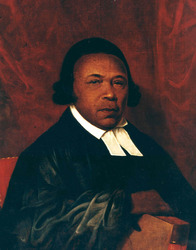
1818 The Cardinal Black Parish of St. Philip's Church in Harlem, New York is Established
1821 Domestic and Foreign Missionary Society (PECUSA) Formed, the Church's Corporate Form and Missionary
1824 The Cardinal Black Parish of St. Philip's Church in of St. James' Lafayette Square in Baltimore, Maryland is Established
1835 General Convention Votes to Send Bishops as Missionaries
1836 Alexander Viets Griswold (Massachusetts), Presiding Bishop
1843 Philander Chase (Illinois), Presiding Bishop
1845 The Cardinal Black Parish of St. Matthew's in Detroit, Michigan is Established
1849 The Cardinal Black Parish of Calvary Episcopal Church in Charleston, South Carolina is Established
1852 Thomas Church Brownwell (Connecticut), Presiding Bishop
1853 Alexander Crummell Becomes a Missionary and Teacher in Liberia
Alexander Crummell
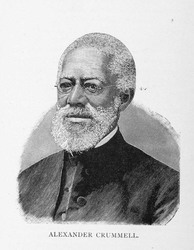
1854 The Cardinal Black Parish of the Good Shepherd in Mobile, Alabama is Established
1863 Birth of The Reverend George Freeman Bragg
During his appointment, African American George Freeman Bragg worked to advance the education of African Americans both within society and the Church.
1865 The Protestant Episcopal Freedmen's Commission Formed
As a result of emancipation, General Convention formed the Freedmen's Commission to aid in education and evangelism.
1865 John Henry Hopkins (Vermont), Presiding Bishop
1867 St. Augustine's Normal School and Collegiate Institute Founded in Raleigh, North Carolina
The founding of St. Augustine's was the first major result of the work of the Freedmen's Commission.
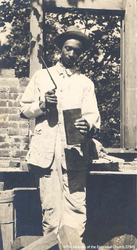
1867 The First Meeting of Anglican Bishops is held in London at Lambeth Palace
1868 Benjamin Bosworth Smith (Kentucky), Presiding Bishop
1871 Women's Auxiliary Formed
1874 James Holly Consecrated Missionary Bishop of Haiti
James Holly was the first African American bishop in the Episcopal Church. In 1861, he led 110 followers to Haiti. He remained in Haiti until his death, rarely returning to the United States.
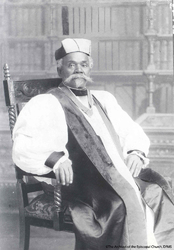
1874 First Ordination of a Black Churchman in Mississippi
1878 Bishop Payne Divinity School Founded
Bishop Payne Divinity School was established in Petersburg, Virginia to train Black men for the priesthood.
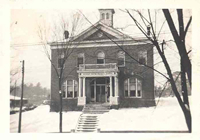
1883 Brotherhood of St. Andrew Founded in Chicago
1883 "Sewanee Conference" of Southern Bishops
Southern bishops involved in interracial work under the segregation policy held the first Sewanee Conference, which set the pattern for "colored convocations" in the south.
1884 First African American Congregation, St. Augustine's, Galveston, Established in Texas
1884 First African American Delegates Sent to General Convention
Black delegates from the dioceses of West Texas and Florida were sent to General Convention in Chicago for the first time.
1884 Alfred Lee (Delaware), Presiding Bishop
1885 Church Commission for Work Among Colored People (CCWACP)
Some local projects for education and evangelization of African Americans were undertaken by the churches after the Civil War. The Episcopal Church, however, takes no official action on behalf of southern African Americans until 1885, when it establishes the Church Commission for Work Among Colored People.
1887 John Williams (Connecticut), Presiding Bishop
1888 St. Paul's Normal and Industrial School Founded in Lawrenceville, Virginia
1889 United Thank Offering Established by the Women's Auxiliary
1891 Phillips Brooks Elected Bishop of Massachusetts
1897 Voorhees College Founded in Denmark, South Carolina
1899 Thomas March Clark (Rhode Island), Presiding Bishop
1903 Daniel Sylvester Tuttle (Missouri), Presiding Bishop
1904 Discussion of Suffragan Bishops Commences
Discussion regarding the election of suffragan bishops began at the 1904 General Convention in Boston.
1906 American Church Institute for Negroes Established
The Domestic and Foreign Missionary Society established the American Church Institute for Negroes whose chief activity was the support of less than a dozen secondary and college educational institutions throughout the South. The largest Episcopal school, for whites and African Americans, that became a part of the American Church Institute for Negroes was a historically African-American four-year college, St. Paul's in Lawrenceville, Virginia.
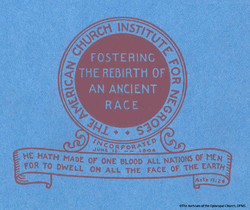
1910 Amendment of Canon Law
Canon law was amended, without mention of race or color, to permit the election of suffragan bishops. Two bishops are elected for ministry to Negroes in time to take their seats at the General Convention of 1919.
1918 Bishops Demby and Delany Consecrated Suffragan Bishops for Colored Work
1919 Church Missions House at 281 Park Avenue South Becomes Center for Mission Program and Administration of the New National Council.
1919 General Convention Adopts the First Churchwide Anti-lynching Resolution
1923 Alexander Charles Garrett (Dallas), Presiding Bishop
1924 Ethelbert Talbot (Bethlehem), Presiding Bishop
1926 John Gardner Murray (Maryland), Presiding Bishop
1929 Charles Palmerston Anderson (Chicago), Presiding Bishop
1930 James Dewolf Perry (Rhode Island), Presiding Bishop
1930 6,304 Clergy and 1,939,453 Baptized Members
1931 Black Churchmen in Virginia Granted Voting Rights
Diocese of Virginia enfranchised Black churchmen to vote in its diocesan convention.
1935 Diocese of Southern Virginia Gives Vote to Black Clergy
1938 Henry St. George Tucker (Virginia), Presiding Bishop
1940 6,335 Clergy and 2,171,562 Baptized Members
1943 Bi-racial Joint Committee on Minorities Formed in National Council
As the successor to the Church Commission for Work Among Colored People, the Bi-racial Joint Committee was formed by the National Council to increase participation of African American laymen in the program of the Church.
1946 Federal Council of Churches Condemns Discrimination
Mainline Protestant churches began to move towards the goal of a "desegregated church in a desegregated society;" when the Federal Council of Churches condemned discrimination as a "violation of the gospel of love and human brotherhood."
1946 Black Churchmen in Southern Virginia Granted Voting Rights
The Diocese of Southern Virginia granted the vote to all Black churchmen in future councils.
1947 Black Churchmen in South Carolina, Georgia, and Arkansas Granted Voting Rights
The dioceses of South Carolina, Georgia, and Arkansas grant the vote to all Black churchmen in future councils.
1947 Henry Knox Sherrill (Massachusetts), Presiding Bishop
1949 Bishop Payne Divinity School Closes
Bishop Payne Divinity School closed due to the decline in enrollment caused by the integration of nearly all Episcopal seminaries.
1949 Pro-Civil Rights Clergy Begin Ministry in Inner City
At Grace Church, Jersey City, New Jersey, priests Paul Moore, C. Kilmer Myers, and Robert Pegram started a parish program aimed at inter-racial fellowship and service to ghetto residents. This became a model for other parishes in other northern cities, including St. Augustine's Mission in New York and St. John's Church in Boston. Black priests and congregations, alternately, saw a decline as many were absorbed into neighboring white churches over the next decade. The Urban Mission Priests group was organized to strengthen urban ministry. Black priests joined with whites in this mission.
1950 6,654 Clergy and 2,540,548 Baptized Members
1951 John Walker is Admitted as the First African American Student to Attend Virginia Theological Seminary
1952 General Convention Adopts Resolution on Racial Discrimination
The General Convention in Boston adopted a resolution that states: "[w]e consistently oppose and combat discrimination based on color or race in every form, both within the Church and without, in this country and internationally." A survey sponsored by the Church's Department of Christian Social Relations showed, however, that Episcopalians generally favored a moderate approach to issues of racism and that 27 percent of the laity were not opposed to segregation within the Church.
1952 Dr. Caution Presents Report on Post-war Negro Work
The Rev. Dr. Tollie Caution, Executive Secretary of Negro Work to the National Council since 1945, prepared a report titled "A Decade of Progress in Negro Work."
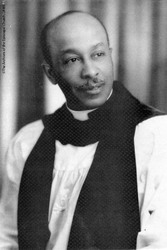
1952 Seminary Upholds Exclusion on Grounds of Race
The Board of Trustees of the University of the South (Sewanee), a school owned by 28 of the Church's southern dioceses, voted to continue the exclusion of Black students from the School of Theology. Sewanee remained only one of ten Episcopal seminaries with no African-American theological students in attendance.
1953 Seminary Reverses Decision under Protest
In the summer of 1953, the board of trustees of the University of the South reversed its admissions decision, after eight faculty members resigned in protest and following resistance from several theology students and a number of southern bishops.
1953 Diocese of South Carolina Allows Blacks to Participate
The diocese of South Carolina, the last diocese to exclude Black clergy and laity from its diocesan convention, voted to allow "Negro representation" at the convention by a count of 85 to 31.
1955 General Convention Changes Meeting Site from Houston to Honolulu
The General Convention of 1955 was scheduled to meet in Houston, but protests from church leaders and Black congregations over segregated facilities in the city led to a late change of venue by Presiding Bishop Sherrill. In Hawaii, the Convention adopted a resolution commending the clergy and people of the Church to accept and support the Brown vs Board of Education decision.
1956 National Council Aims for Total Desegregation
The National Council of the Episcopal Church revised a set of "Guiding Principles Pertaining to the Work of the Church among Negroes" to include the ultimate goal of desegregation for all church institutions and agencies, based on recommendations of its advisory Bi-racial Committee.
1956 National Council Creates the "Southern Project"
The National Council of Churches authorized the creation of the "Southern Project," which was designed to give aid to local church activists who were attacked due to their public support of desegregation.
1957 The Era of the Racial Episcopate Ends
The attempts of the Church at racial episcopacies with bishops Delany and Demby ended after the death of Bishop Demby (Delany died in 1928). The Church declared this idea unsuccessful.
1958 General Convention Supports Equal Opportunity and House of Bishops Releases Pastoral Letter
The General Convention approved a resolution supporting equal opportunity in education, housing, employment, and public accommodations. The House of Bishops released its pastoral letter on the recent Lambeth Conference, noting that racial tensions in the United States threatened to alienate the good will of other countries. The letter addressed the issue of civil disobedience but neither supported nor renounced its use.
1958 Arthur Lichtenberger (Missouri), Presiding Bishop
1959 Episcopal Society for Cultural and Racial Unity (ESCRU) Forms
This unofficial church organization was formed to promote acceptance of the Churchs policies of racial inclusiveness. John B. Morris was named Executive Director, and the group established a national office in Atlanta, Georgia. By August 1960, more than 1,000 Episcopal clergy and laity were members of ESCRU.
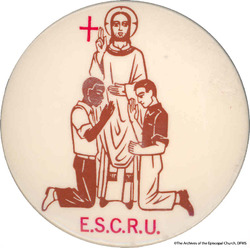
1960 ESCRU Supports Church Demonstrations
During the summer of 1960, a new aspect of the sit-in movement in the South took place in Atlanta and Savannah, Georgia, when Black college students visited white churches for Sunday services.
1960 9,079 Clergy and 3,444,265 Baptized Members
1961 ESCRU Addresses Intermarriage and Alienates Much of Southern Church
At the first annual meeting of the Episcopal Society for Cultural and Racial Unity, members passed a memorial requesting the House of Bishops to state the position of the Church with respect to marriage between persons of different color. The memorial on intermarriage identified ESCRU as a militant group to some and alienated the laity and the clerical leadership in large parts of the South.
1961 15 Clergy Arrested on Prayer Pilgrimage
An interracial group of 28 clergy began a pilgrimage by bus from New Orleans to the 1961 General Convention in Detroit. The group, organized by ESCRU, planned to visit and agitate segregated churches and church-related educational institutions.
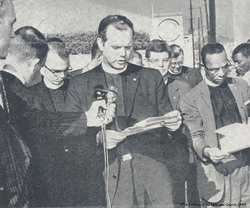
1961 Church Declares Prejudice to Be Inconsistent with the Gospel
The General Convention adopted a resolution expressing regret for past and present discrimination within the Church and encouraged all levels of the Church to reconcile itself to the "comprehensiveness of the body of Christ" and to establish worship and study programs in this area.
1961 Episcopal Hospital Targeted for Protests
St. Johns Hospital in Brooklyn, New York, an Episcopal institution of the Diocese of Long Island, was picketed for their policy of excluding Black patients from semi-private facilities. ESCRU protested St. Johns policy and leads a public vigil outside the hospital and at the bishops office in Garden City, Long Island. Johnathan G. Sherman, Suffragan Bishop of Long Island, defended the hospitals policy on overtly racist grounds saying, "the Negroes are a gregarious race (one of their most loveable traits), and they like to visit in sixes and sevens" thereby disturbing white patients. The hospitals policy of segregated room assignments finally came to an end as the result of outside intervention by the New York City Commission on Human Rights.
1962 Episcopal Day School Denies Entrance to Martin Luther King, Jr.s Son
An application on behalf of the son of Dr. Martin Luther King, Jr., submitted to Lovett School in Atlanta, Georgia, was rejected based on unanimously adopted school guidelines that prohibited African American students.
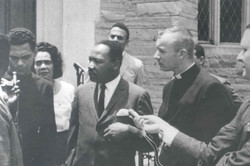
1962 African-American Elected Suffragan Bishop
The Ven. John M. Burgess was elected Suffragan Bishop of the Diocese of Massachusetts on September 22 and consecrated December 8. He was the first African-American bishop with authority over Black and white congregations, and became the first African-American diocesan bishop in 1969.
1963 Presiding Bishop Commits Church to Action
Presiding Bishop Arthur Lichtenberger issued a "Whitsunday Statement" committing the Episcopal Church to maximum participation in the civil rights movement. The statement had a profound impact on the Church. Many interpreted it as the Church's sanction of direct action against segregation.
1963 Religious Groups Join March on Washington
The Episcopal Church participated in the planning of the March on Washington D.C. for Jobs and Freedom. Observers at the march estimated more than half of the banners and signs were from churches, synagogues, and related agencies and organizations.
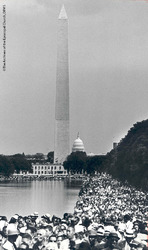
1963 National Council Staff Members Arrested at Protest
Two members of the National Council staff, Bishop Daniel Corrigan and Father Daisuke Kitagawa, Executive Secretary of the Division of Domestic Missions, were among a group arrested trying to desegregate Gwynn Oak Amusement Park in Baltimore, Maryland.
1964 National Council of Churches Establishes Delta Ministry
The National Council of Churches' Commission on Religion and Race established the Delta Ministry. The year-old commission determined that Black citizens of Mississippi wanted the Churches help in their struggle. Beyond voter registration, there was a vital need for programs of social service and community development. The Rev. Warren McKenna, an Episcopal priest and member of the National Council of Churchs (NCC) staff, served as Co-director of the Delta Ministry. The Ministry was concentrated in some of the poorest and most primitive counties in the state. It enrolled 70,000 Black voters, organized workshops for Black candidates seeking public office, and provided other community services.
1964 General Convention Adopts Policy Prohibiting Racial Discrimination in Churches
1964 King Speaks to ESCRU
ESCRU sponsored a dinner at the General Convention where Martin Luther King, Jr. addressed an audience of nearly 2,000. King condemned segregation in American churches saying, "the Church is still the most segregated major institution in our country." Dr. King was named the winner of the 1964 Nobel peace prize the following day.
1965 Seminary Students Work in Selma
Judith Upham and Jonathan Daniels, students from the Episcopal Theological School, Cambridge, Massachusetts, who were present for the Selma demonstrations, decided to return to Selma as ESCRU's representatives. They worked closely with civil rights leaders and also attempted to open communication with St. Paul's Church, the all-white Episcopal parish in Selma. When Upham and Daniels attended an early-morning Eucharist on Easter Sunday, 1965, accompanied by a group of young Black people, they are directed to the rear pew, from which they were the last to receive Holy Communion. ESCRU issued a statement attacking the bishops approval of segregated seating in parish churches.
1965 Jonathan Daniels Killed
Seminary student and civil rights crusader Jonathan Daniels was shot at close range by a former deputy sheriff in Hayneville, Alabama. Daniels was the 26th civil rights worker killed in the South. ESCRU launched "Operation Southern Justice," a campaign undertaken in conjunction with the NCC and other groups to force the integration of southern juries, which have not yet convicted anyone accused of these murders.
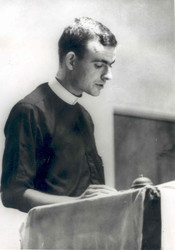
1965 John Elbridge Hines (Texas), Presiding Bishop
1966 Negro Churchmen Support Black Power
A position statement formulated in support of Black Power by the National Committee of Negro Churchmen was signed by nine Episcopalians, including Bishop John F. Burgess, Suffragan Bishop of Massachusetts.
1966 ESCRU Brings Attention to Global Racism
ESCRU coordinated Episcopal participation in demonstrations at the Chase Manhattan Bank and the Episcopal Church Center in New York City to protest church investments in South African banks that were being used to support apartheid. The Executive Council of the Episcopal Church responded by appointing a committee to study ways in which the Church might transfer some of its assets to banks located in poor urban centers.
1966 ESCRU Charges the Church with Heresy for Continued Racism
ESCRU charged the Episcopal Church with heresy because of its continued racism. At its meeting in October 1966, the Board of Directors adopted a statement, which read: "We charge the Church to which we belong and which we love with heretical and blasphemous distortion of the Christian doctrine of man." Citing the racism implicit in the parish system, clergy placement, religious education, and church investments, the statement was delivered to the Presiding Bishop and in January 1967 became the basis of a petition, which was addressed to the General Convention. Over 10,000 signatures were obtained on the petition.
1968 Union of Black Clergy and Laity (UBCL) Forms
The Ad Hoc Committee of Negro Clergy gathered in Philadelphia to form a united group opposed to racism within the Church. Although initially composed of clergymen, the UBCL sought to involve Black laity and emerged as a powerful and innovative organization on issues relating to racism in the Church. It was renamed the Union of Black Episcopalians in 1971.
1969 ESCRU Leads Ash Wednesday Protest
On Ash Wednesday, the Chicago chapter of ESCRU sponsored several demonstrations to publicize concern over racism in the Episcopal Church's curriculum materials. Clergymen burned the offensive curriculum materials and imposed ashes on the heads of the penitents.
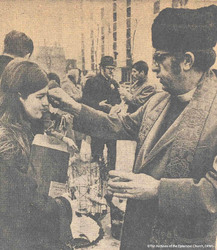
1969 Special Convention Addresses Racism
The Special General Convention of 1969 met in South Bend, Indiana, from August 31 - September 5. The General Convention of 1967 had requested this meeting, which included additional delegates to ensure that youth, women, and minority groups would be adequately represented.
1970 ESCRU Disbands
ESCRU was denied a request for funding from an outside foundation. On October 18, ESCRU sponsored a banquet at which the Rev. Jesse Jackson was the speaker. At the conclusion of the banquet, ESCRU's Vice President Barbara Harris announced that ESCRU's life had come to an end.
1970 First African American Bishop of the Episcopal Church Consecrated
John Burgess of Massachusetts became the first African American diocesan of the Episcopal Church.
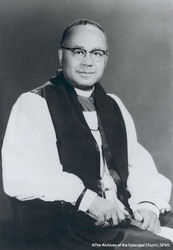
1970 Charles Willie Elected as Vice President of the House of Deputies
African American Charles Willie was elected as Vice President of the House of Deputies, a position he resigned from in 1974 after the House of Bishops considered the ordinations of the "Philadelphia 11" to be invalid.
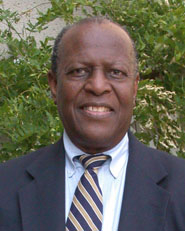
1970 11,772 Clergy and 3,475,164 Baptized Members
1970 Ordination of Women to the Diaconate Approved
1970 Women Allowed to Serve as Delegates to General Convention
1974 John Maury Allin (Mississippi), Presiding Bishop
1974 Eleven Women Ordained Priest in Philadelphia
The ordinations of the "Philadelphia 11" at the Church of the Advocate were declared invalid by the House of Bishops. That is later retracted with the decision at the 1976 General Convention to regularize the ordinations.
1976 General Convention Approves Ordination of Women in All Three Orders
There was strong opposition to this resolution approving the ordination of women to the three orders of bishop, priest, and deacon, and a division over gender equality and human sexuality developed within the Church.
1976 Dr. Charles Radford Lawrence, II Elected as President of the House of Deputies
In 1967, Dr. Lawrence became a lay delegate of the House of Deputies. At the 1976 General Convention, he was elected president of the House of Deputies and would serve in that office until 1985. Dr. Lawrence holds the distinction of being the third lay person and the first African American to hold the position.
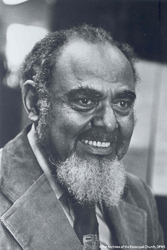
1977 Bishop Paul Moore Ordains Homosexual to the Priesthood
The Rev. Ellen Barrett is ordained in the Diocese of New York by Bishop Paul Moore.
1979 New Book of Common Prayer Book Approved
The approval of a new standard Prayer Book causes an additional fracture within the Church.
1980 13,089 Clergy and 3,037,420 Baptized Members
1986 Edmond Lee Browning (Hawaii), Presiding Bishop
1989 Barbara Harris is Consecrated Suffragan Bishop of Massachusetts
Upon her consecration, Barbara Harris becomes both the first woman and first Black woman bishop in the Anglican Communion.
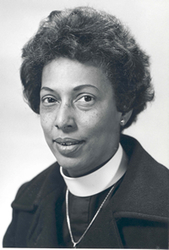
1990 14,878 Clergy and 2,446,050 Baptized Members
1991 Pamela Chinnis Elected First Woman President of House of Deputies
1998 Frank Tracy Griswold III (Chicago), Presiding Bishop
2003 Gene Robinson Consecrated Bishop of New Hampshire
Gene Robinson is the first openly gay priest to be ordained bishop in the Episcopal Church.
2006 Episcopal Church Elects First Woman Presiding Bishop
Katharine Jefferts Schori, Bishop of Nevada, is elected as the 26th Presiding Bishop of the Episcopal Church.
2006 General Convention Resolution 2006-A123
General Convention passes Resolution 2006-A123, affirming that racism is a sin, apologizing for the complicity of the Church in the slave trade, and seeking to repair the injustice "both materially and relationally."
2008 Episcopal Church Holds "Day of Repentance"
In response to a call from the 2006 General Convention, the Episcopal Church publicly apologizes for its complicity in slavery in a service held at St. Thomas African Episcopal Church, the first Black Episcopal church in the United States.
2015 Episcopal Church Elects First African American Presiding Bishop
Michael Curry, Bishop of North Carolina, becomes the 27th Presiding Bishop of The Episcopal Church.
2016 Episcopal Church Implements "Becoming Beloved Community."
In response to Resolution 2015-C019, members of the House of Bishops and the House of Deputies create an anti-racism resource, Becoming Beloved Community, “a set of inter-related commitments around which Episcopalians may organize our many efforts to respond to racial injustice and grow a community of reconcilers, justice-makers, and healers.” The resource seeks to root Episcopal responses to racism in the Baptismal Covenant, and emphasizes the ongoing nature of the journey towards reconciliation and healing.
2017 First African American Woman Elected Bishop Diocesan
In April of 2017, Jennifer Baskerville-Burrows becomes the eleventh Bishop of Indianapolis.

